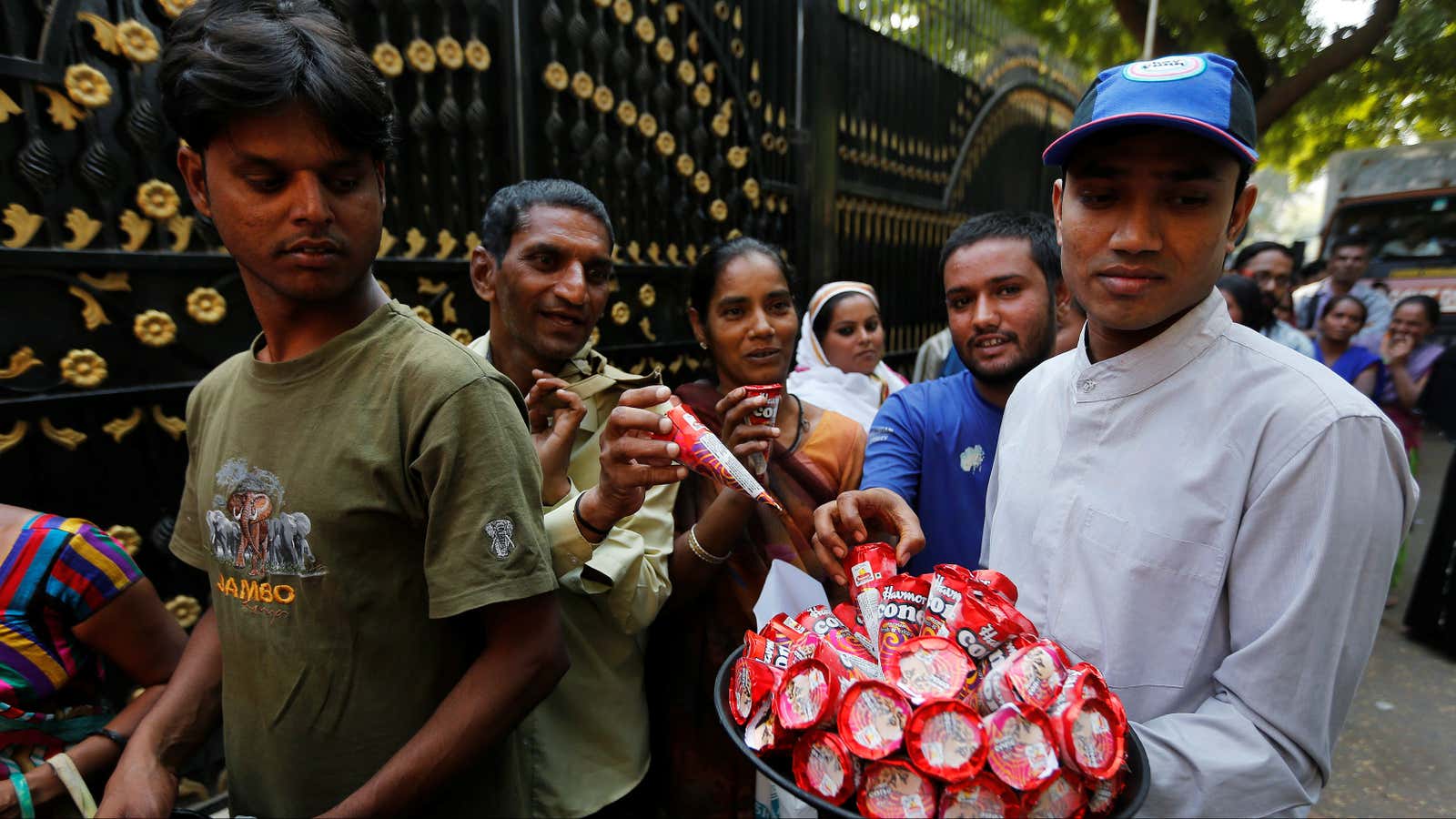Distress may not always bring out the best of Indians, but it does often bring out the funny, the ingenious, and the poignant in them.
In the two weeks following the government’s decision to demonetise two of India’s most used rupee denominations, accounting for 86% of the total Indian currency in circulation by value, citizens have been in battle mode.
There has been a mad scramble for cash, with long hours spent in queues to exchange old notes for new ones—sometimes successfully, sometimes not.
So far, banks have struggled to keep up with demand, leaving many short of even small change for basic daily necessities. Indians, though, are nothing if not resourceful. So, this (hopefully temporary) new normal has unleashed a wave of quirky adaptations, at times heartwarming and downright absurd otherwise.
A quick trip around the country affords us a glimpse of what it is up to.
Hacking the queue
As ordinary Indians, with hardly any unaccounted wealth to hide, ended up waiting in slow-moving lines, one set of people knew how to get the better of this struggle. Some innovative locals in Kerala developed a smart system, marking their places in queues with stones and paper, while they themselves escaped the labour.
Praying the taxman away
Demonetisation has led to a windfall for temples, churches, and other religious institutions that are allowed to accept notes in any denomination as donations. Naturally, god’s cash boxes are by now stuffed with the now-worthless notes.
For instance, at the Tirumala temple in Tirupati, Andhra Pradesh—the world’s second-richest Hindu place of worship—daily collections have doubled since the announcement. In Chennai, the temple’s governing body received Rs4.5 crore in Rs1,000 notes and Rs5 crore in Rs500 notes between Nov. 01 and Nov. 18, officials told The Hindu newspaper.
The travel bug strikes
The government had allowed the use of the old notes to book seats on trains and flights till Nov. 11. As a result, ticket sales surged, with bookings for even the most expensive train seats going through the roof to around 27,000 per day compared to the usual 2,000. Clearly, people were gaming the system, cancelling the tickets later to claim refunds in new notes.
So now, Indian Railways is issuing refunds of above Rs10,000 only via cheques or bank transfers, forcing individuals to reveal their identities. As for airlines, now tickets bought using old notes are non-refundable.
ATM updates
For many, the chief struggle was to find a functioning ATM. So Bengaluru resident Tinu Cherian Abraham took it upon himself to visit 23 ATMs in the city, posting updates on Twitter to inform locals.
Wedding bells
The government’s move, coming at the beginning of the wedding season, was bound to hit families hard. Some, like the south Indian mining baron Gali Janardhan Reddy, pulled out all the stops. His daughter’s ostentatious nuptial ceremony on a 30-acre venue in Bengaluru took place just days after Modi’s big announcement.
However, most others were in a fix. For, almost every other Indian wedding sees a significant portion of the expenses—from shamianas to catering to electrical arrangements to gifts—being made in cash. The share of cash usually increases as one moves down the economic ladder.
So, the Indian government is said to have made an exception, though this was announced officially only on Nov. 21. Those who had planned weddings could now withdraw up to Rs2.5 lakh under certain conditions.
By then, though, people were already getting fake wedding invites printed, even if it was just a single copy to convince bank officials.
A match made in the finance ministry? Say that again!
Picture perfect
By all accounts, many Indians are yet to see or touch the new denomination notes. Yet, counterfeits are already in play, according to media reports. So much so that even photocopies are being used by the unscrupulous to swindle the gullible who haven’t seen the real Rs500 and Rs2,000 notes yet. In the meantime, an enterprising lot—in China, according to some reports—has introduced products carrying images of the new notes. These trinkets include purses and mobile phone covers.
Help from the stars
As urban customers switch to using cards and e-wallets to pay for services, demonetisation has boosted business for most digital-first companies. And that goes for astrology startups, too. Firms such as Askmonk.in and Astrobudy have seen a 40-50% increase in enquiries from Indians seeking reassurance for the tough times ahead. Kochi-based Monkvyasa.com, for instance, saw daily enquiries double to 1,000.
“Most of the callers are between the age group of 24 to 35, usually working class. The uncertainty in the economy has made many worried,” Dinup Kalleril, co-founder of Monkvyasa.com, told The Economic Times newspaper.
Good samaritans
Even as demonetisation took its toll, particularly on the elderly, a number of people have tried to make things more bearable. Several Sikhs were seen distributing biscuits, tea, and water to those in queues in various parts of the country. Many others narrated tales of timely help from rank strangers. Even fast-food chain Pizza Hut gave away slices of pizzas for free outside certain banks in Delhi, Mumbai, and Bengaluru.
